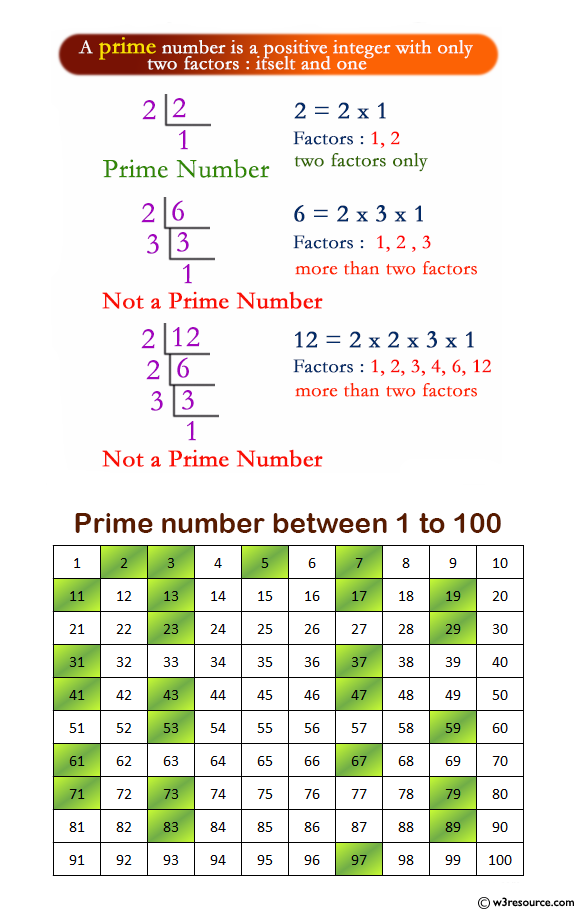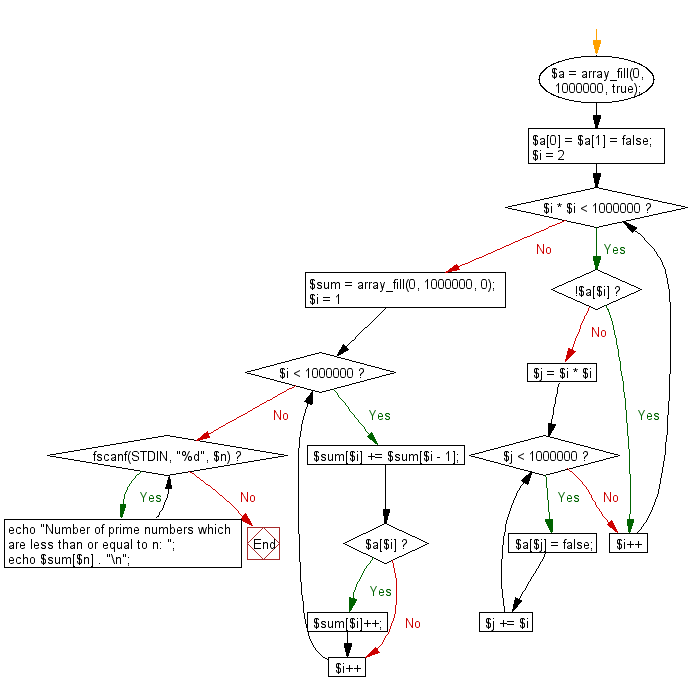PHP Exercises: Print the number of prime numbers which are less than or equal to a given integer
PHP: Exercise-52 with Solution
Write a PHP program to print the number of prime numbers which are less than or equal to a given integer.
Input:
n (1 ≤ n ≤ 999,999) .
Pictorial Presentation:

Sample Solution: -
PHP Code:
<?php
$a = array_fill(0, 1000000, true);
$a[0] = $a[1] = false;
for($i = 2; $i * $i < 1000000; $i++){
if(!$a[$i]) continue;
for($j = $i * $i; $j < 1000000; $j += $i){
$a[$j] = false;
}
}
$sum = array_fill(0, 1000000, 0);
for($i = 1; $i < 1000000; $i++){
$sum[$i] += $sum[$i - 1];
if($a[$i]) $sum[$i]++;
}
while(fscanf(STDIN, "%d", $n)){
echo "Number of prime numbers which are less than or equal to n: ";
echo $sum[$n] . "\n";
}
?>
Sample Output:
Sample Input: 50 Number of prime numbers which are less than or equal to n: 15
Flowchart:

PHP Code Editor:
Have another way to solve this solution? Contribute your code (and comments) through Disqus.
Previous: Write a PHP program to compute the amount of the debt in n months.
Next: Write a PHP program to compute the radius and the central coordinate (x, y) of a circle which is constructed by three given points on the plane surface.
What is the difficulty level of this exercise?
Test your Programming skills with w3resource's quiz.
PHP: Tips of the Day
How to Sort Multi-dimensional Array by Value?
Try a usort, If you are still on PHP 5.2 or earlier, you'll have to define a sorting function first:
Example:
function sortByOrder($a, $b) {
return $a['order'] - $b['order'];
}
usort($myArray, 'sortByOrder');
Starting in PHP 5.3, you can use an anonymous function:
usort($myArray, function($a, $b) {
return $a['order'] - $b['order'];
});
And finally with PHP 7 you can use the spaceship operator:
usort($myArray, function($a, $b) {
return $a['order'] <=> $b['order'];
});
To extend this to multi-dimensional sorting, reference the second/third sorting elements if the first is zero - best explained below. You can also use this for sorting on sub-elements.
usort($myArray, function($a, $b) {
$retval = $a['order'] <=> $b['order'];
if ($retval == 0) {
$retval = $a['suborder'] <=> $b['suborder'];
if ($retval == 0) {
$retval = $a['details']['subsuborder'] <=> $b['details']['subsuborder'];
}
}
return $retval;
});
If you need to retain key associations, use uasort() - see comparison of array sorting functions in the manual
Ref : https://bit.ly/3i77vCC
- New Content published on w3resource:
- HTML-CSS Practical: Exercises, Practice, Solution
- Java Regular Expression: Exercises, Practice, Solution
- Scala Programming Exercises, Practice, Solution
- Python Itertools exercises
- Python Numpy exercises
- Python GeoPy Package exercises
- Python Pandas exercises
- Python nltk exercises
- Python BeautifulSoup exercises
- Form Template
- Composer - PHP Package Manager
- PHPUnit - PHP Testing
- Laravel - PHP Framework
- Angular - JavaScript Framework
- Vue - JavaScript Framework
- Jest - JavaScript Testing Framework
